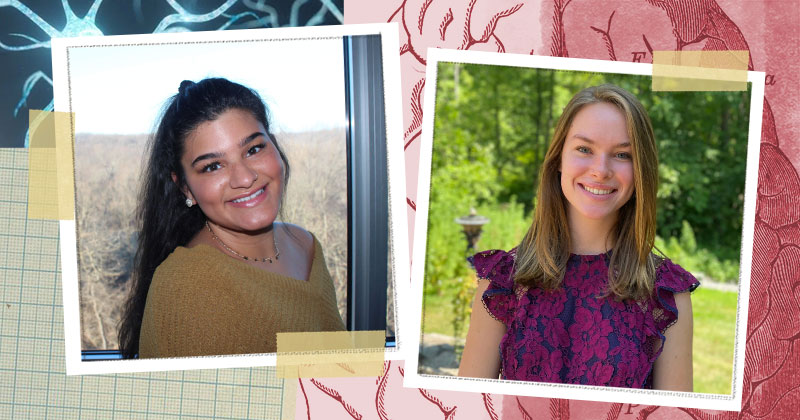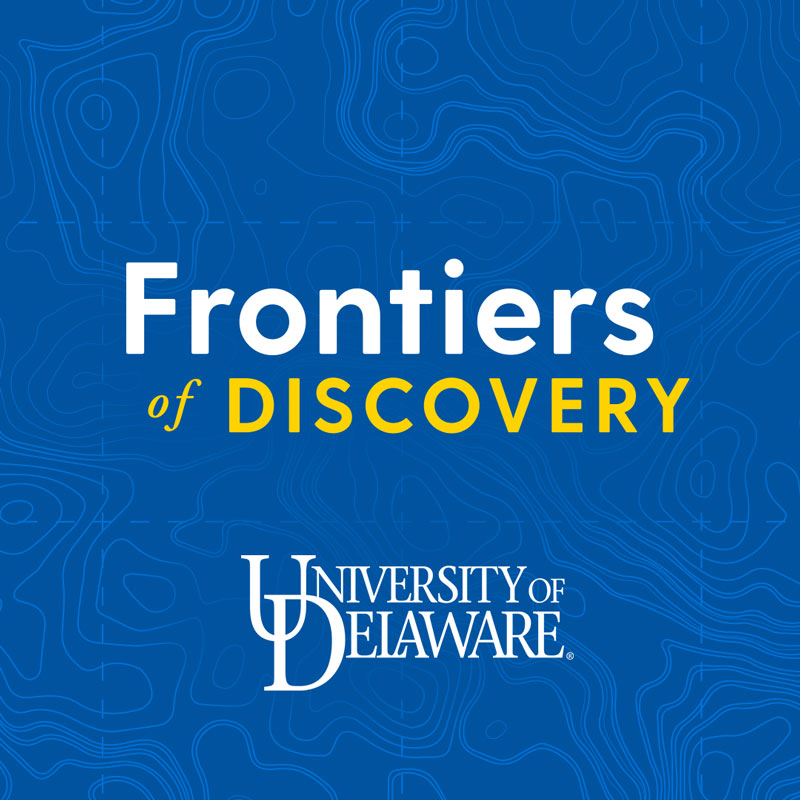


Boosting brain activity
Illustration by Jeffrey C. Chase August 27, 2020
Health science majors help older adults stay sharp
Editor’s note: Research, community service, internships and study abroad typically make summers memorable for many University of Delaware students. While the coronavirus (COVID-19) pandemic has sidetracked some of these activities, UD students are continuing with hundreds of remarkable projects remotely. Check out our series of profiles and stories, which also are being highlighted on the Summer Spotlight website.
University of Delaware student Kerry Keough is a health behavior science major with a minor in public health. She is from Wilton, Connecticut and expects to graduate in May 2021.
Alejandra Salazar-Soto also is studying health behavior science as a precursor to pursuing an advanced degree in occupational therapy. Born and raised in Puerto Rico, Salazar-Soto now resides in Newark, Delaware and is on track to graduate in May 2021.

Q: What are you studying, where and with whom?
Salazar-Soto: I’m studying cognition and memory within the older adult population alongside Elizabeth Orsega-Smith, associate professor of behavioral health and nutrition, and Kerry Keough, also a rising senior. The purpose of our research is to determine the impact of a brain training program on cognition and quality of life of older adults.
Keough: Before data collection began, we had each participant answer questionnaires on their quality of life and cognition (meaning how they acquire knowledge), which are our measurements for the research study. We’ll have participants respond to these same measures at the end of the study as well. At the beginning of each brain training camp session, we start out with an icebreaker related to the day’s topic. For example, we began our poetry module by sharing Haikus we had written the previous week. Next, we collectively read through articles related to the topic and have a discussion on the information. We wrap each session up by watching videos and playing interactive games. For instance, we watched videos on how the costumes in the Broadway show Wicked were made and completed a “Guess that Broadway musical” trivia game. Answers on the questionnaires and data collected during the camp will help us better understand how these activities affect the participants’ memory.
Q: What inspired this project?
Keough: I worked alongside Dr. Orsega-Smith for the entire 2019-2020 school year, and my partner, Alejandra, worked with us since spring 2020. We have been studying cognition and memory loss in older adults and created a brain training program based off our findings and previous research, by Dr. Orsega-Smith and another undergraduate researcher who conducted a similar brain training camp and captured data on how slow participants felt their thinking was, as well as measures of how hard it was for them to focus, multitask, etc. before — and after — participating in the camp.
Q: What is it about this topic that interests you?
Keough: I’ve always had an interest in helping others. When I was a kid, I ended up breaking my femur and having a long stay in the hospital. Ever since then, I’ve had a drive to improve the lives of others, especially in healthcare. My goal in completing this research is to gain a better understanding of the older adult population and to use my findings to improve the healthcare field.
Salazar-Soto: The most interesting part about this topic is that, essentially, we’re all aging. We are all at risk of losing memory or cognition with age. I’m most interested in discovering new ways in which we can deter some of the early symptoms of memory loss. Since my future career goals are in the occupational therapy field, I wanted to gain more knowledge to better help patients in the future and to address the potential negative effects of cognitive deficits on day-to-day living.
Q: How has COVID-19 shaped your plans for this project? Is flexibility something that comes easily for you?
Salazar-Soto: With the global pandemic, we had to make our brain training program entirely online. I think that flexibility does come easily for me because I look at it as being able to accommodate different situations and scenarios.
Keough: Before COVID-19 hit, our plan was to meet with older adults at a local senior center to lead our brain training camp. Since that is no longer feasible, we have transitioned our work to take place over an online platform. While we are still able to have face-to-face interaction digitally, it is not the same. Nevertheless, we’re making the best of the situation, and our program is going well.
Q: What are the possible real-world applications for your study?
Salazar-Soto: Memory loss is a prevalent condition nationwide, as we are all aging. Our brain training program is a structured way in which older adults can interact with each other and participate in different activities to encourage thinking and boost brain activity.
Keough: As a first responder with UD’s Emergency Care Unit, I’ve had the privilege to assist the community when they need medical attention most. Partaking in this research has given me a more well-rounded understanding of the older adult population and has provided me with a new skill set I can use to be a better healthcare provider. Communication is key, and now that I understand their needs better, I can more effectively care for the population.
Q: How would you explain your work to a fifth grader or someone’s grandparent?
Salazar-Soto: I would explain our work as enrolling a group of older adults to a mini-camp that could potentially make them think better or even remember things more easily/faster. This “camp” can also be seen as a way for older adults to interact and have fun with each other with the help of games and other activities.
Keough: We are working with older adults each week in a brain training camp in hopes that our work will improve thinking and slow memory loss. Each week, we teach older adults about different topics, ranging from languages to the history of Delaware. We go through articles, comprehension questions and fun games, like word searches and trivia.
Q: What advice would you give younger kids (middle school or high school) with similar interests?
Keough: If you have an interest in partaking in research, jump right in. In college, it’s never too early to start. At the beginning of my freshman year, I thought I was too young and inexperienced to begin research, when in reality, that’s the best place to start. As long as you’re dedicated to the research, you can accomplish remarkable things before you graduate.
Salazar-Soto: I would tell younger students to participate in anything that they might have an interest in — to really see where their passion might be. Along that path, they might find what an ultimate career goal or maybe even learn something new about what they are researching and about themselves.
Q: Have the changes required by the pandemic changed your perspective on anything?
Salazar-Soto: I think that the changes required by the pandemic made me realize how much science and the healthcare field has evolved. I think having everything being moved online/remote is just our new “normal,” and it just shows how much society is changing.
Keough: This pandemic has definitely shifted my perspective. Circumstances can change in the blink of an eye, and we have no choice but to adapt and overcome. Instead of remaining frustrated over what could have been this summer, I’ve tried to surge forward with an open mind and a willingness to learn.
Contact Us
Have a UDaily story idea?
Contact us at ocm@udel.edu
Members of the press
Contact us at 302-831-NEWS or visit the Media Relations website

